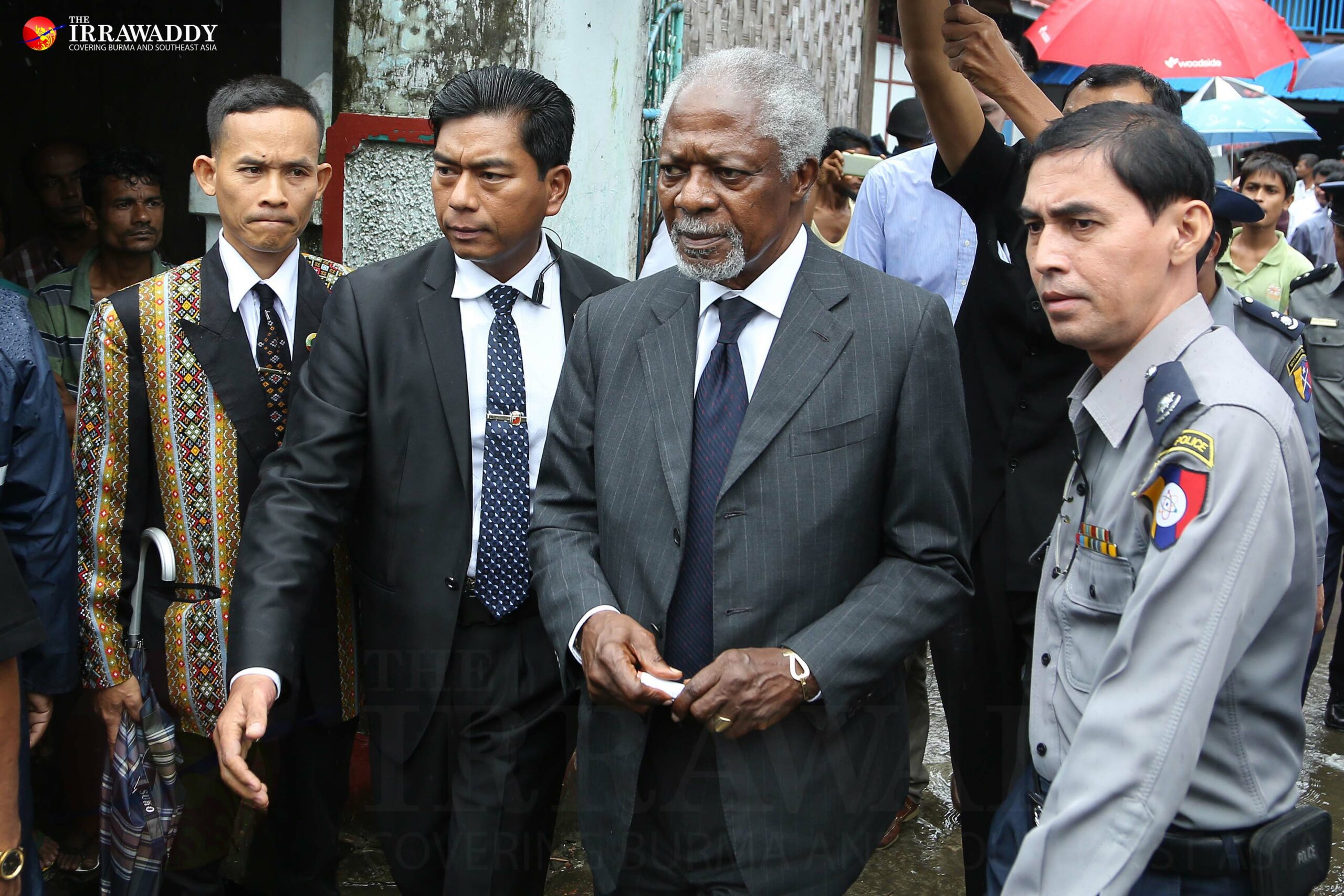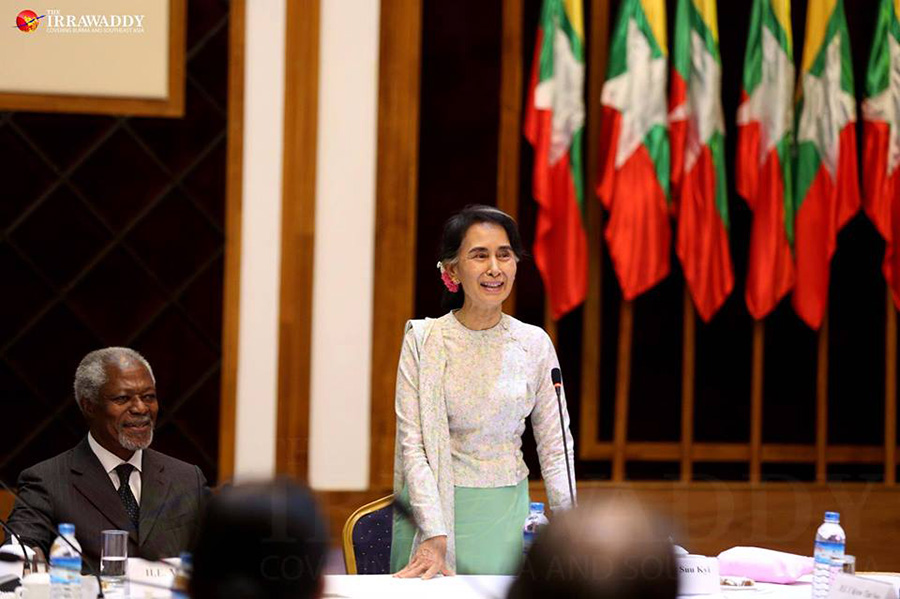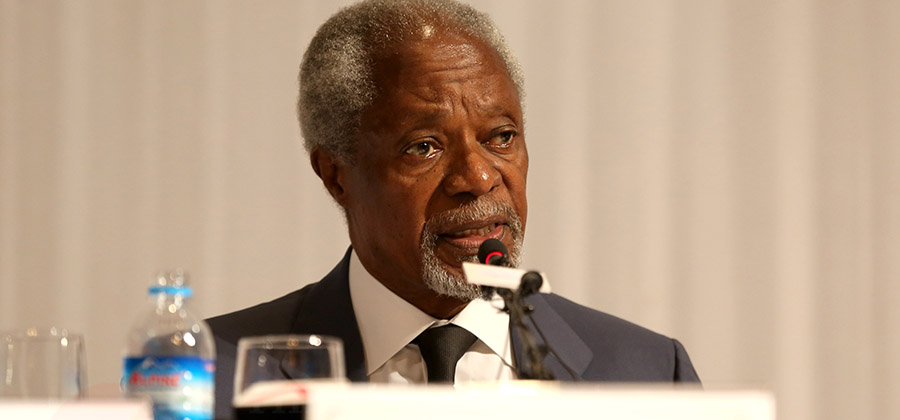The former United Nations secretary-general and Nobel Peace Prize laureate Kofi Annan died on Saturday at the age of 80. Despite his top job at the UN, the Ghanaian is remembered in Myanmar for his involvement in tackling the crisis in Rakhine State in the west of the country, where communal strife between ethnic Arakanese and Rohingya Muslims had been on the rise since 2012.
It all started in 2016, when Myanmar State Counselor Daw Aung San Kyi approached Annan and asked him to lead a commission that would analyze the situation in Rakhine State. It was the first time foreign experts had been invited to assist the country’s efforts in confronting the Rakhine crisis. He accepted the offer to lead the Advisory Commission on Rakhine State and made recommendations on ending the violence in the conflict-torn state and promoting development, despite some resistance against his commission from local ethnic Arakanese, opposition parties and military.
Daw Aung San Suu Kyi immediately endorsed the commission’s 88 recommendations and vowed to implement them in the shortest timeframe possible given the conditions on the ground. Annan’s recommendations have been treated as a roadmap for promoting communal reconciliation and regional development in Rakhine.
Since the formation of the commission, The Irrawaddy has extensively covered stories related to the nine-member commission. On the death of Kofi Annan, we revisit some of our stories to reflect the former UN boss’ contribution to Rakhine State.
Aug. 24, 2016
Former UN Chief Kofi Annan to Head New Commission on Arakan State
The former United Nations secretary-general and Nobel Peace Prize laureate Kofi Annan was named by Myanmar’s State Counselor’s office as the leader of a nine-member Advisory Commission on Rakhine State to recommend “lasting solutions to complex and delicate issues” in the conflict-torn region.
Aug. 25, 2016
ANP Demands Cancellation of Kofi Annan-Led Arakan State Commission
The largest Rakhine political party, the Arakan National Party (ANP), has demanded that the government cancel the newly formed Kofi Annan-led Arakan State Advisory Commission. The ANP expressed objection to the three non-Myanmar members selected to serve on the commission, stating that they would not be able to understand the background and current situation on the ground in Arakan State, as well as that it would harm the rights of indigenous people—a reference to the Buddhist Arakanese—and national sovereignty.
Aug. 30, 2016
ANP Lawmaker Calls for Removal of International Experts From Arakan State Commission
A Rakhine lawmaker from the Arakan National Party (ANP) at the Lower House submitted an urgent parliamentary proposal calling for the replacement of three non-Myanmar experts serving on the Rakhine State Advisory Commission with local academic specialists. With support from the military representatives and main opposition Union Solidarity and Development Party, the proposal called the inclusion of international experts “foreign interference in internal affairs.’ But the proposal failed to earned parliamentary approval, as the majority of NLD lawmakers rejected it.
Sept. 5, 2016
Kofi Annan ‘Confident’ in Arakan State Advisory Commission’s Mandate
Kofi Annan said despite the challenges facing Arakan State being “complex and deep-rooted,” he remains “confident that we can assist the people of Rakhine to chart a common path for a peaceful and prosperous future.” During the first meeting with the commission members and State Counselor Daw Aung San Suu Kyi in Yangon, the former United Nations secretary-general said the advisory commission would act rigorously to find ways to address the situation in Arakan State, and work closely with the people of the region, including engaging with community and religious leaders, local administration and members of the State Counselor’s Office.
Sept. 7, 2016
Advisory Commission Completes First Trip to Arakan State

Kofi Annan-led Rakhine State Advisory Commission completed its first two-day trip to Rakhine State to learn about local perspectives on trust-building from the Buddhist Rakhine and Muslim Rohingya communities in the state capital, Sittwe. Local residents and Buddhist monks staged protests against the commission, challenging what they perceived as “foreigners’ biased intervention” from the nine-member panel.
Sept. 8, 2016
Kofi Annan: Commission Will Not Do ‘Human Rights Investigation’ in Arakan State
Upon his arrival from Rakhine, Kofi Annan told media in Yangon that the commission’s purpose was not to investigate rights abuses, but to write an “impartial report.” He explained that the objective of the advisory commission was to provide recommendations for the Myanmar government in accordance with international standards in order to facilitate a lasting solution to the conflict in Arakan State.
Oct 9, 2016
Nine Police Dead in Arakan State Border Attacks
Nine police officers were killed and five were injured during a series of attacks by Muslim militants on border guard headquarters and outposts near the Bangladeshi border in northern Rakhine State.
Dec. 6, 2016
Kofi Annan: Charge of ‘Genocide’ Should Not Be Used ‘Loosely’ in Arakan State
Chairman of the Arakan State Advisory Commission Kofi Annan told reporters at a Yangon press conference that when describing the crisis in Rakhine State, the term “genocide” should be used with caution.
March 16, 2017
Arakan State Advisory Commission Releases Interim Report
The Rakhine State Advisory Commission released an interim report for the Myanmar government to improve the situation in Rakhine State, calling for immediate and unimpeded access for humanitarian aid organizations and the media to areas of northern Rakhine State.
July 10, 2017
U Zaw Htay: Kofi Annan Commission is Govt ‘Shield’
The Myanmar government spokesperson said the Annan commission was serving as a shield for the Myanmar government. “Were it not for the Kofi Annan commission, the allegations would be much worse, I think,” he said.
Aug. 19, 2017
Did Advisory Commission Remedy Rakhine State’s Conflict?

Since its formation, the Kofi Annan-led Advisory Commission on Rakhine State had been under fire from local ethnic Arakanese people, opposition parties, and the military. Given the resistance, would the recommendations to be made by the commission for Rakhine State be helpful?
Aug. 22, 2017
Rakhine Advisory Commission’s Kofi Annan Arrives in Yangon
Kofi Annan arrived in Yangon to release his Rakhine State Advisory Commission’s final report on Rakhine State.
Aug. 24, 2017
Kofi Annan: Don’t Leave Citizenship Issues ‘To Fester’

The commission submitted its final report to Myanmar Army commander-in-chief Snr-Gen Min Aung Hlaing and State Counselor Daw Aung San Suu Kyi in Naypyitaw. The report criticized several aspects of Myanmar’s 1982 Citizenship Law as failing to meet international standards, while still encouraging the government to accelerate the national verification process in line with that law in Rakhine State. But the military questioned the “impartiality” of the commission’s report and urged Annan’s delegation to review some “factually wrong” points.
Aug. 25, 2017
Muslim Militants Stage Major Attack in Rakhine
Several hours after the submission of the commission’s final report, the Arakan Rohingya Salvation Army launched attacks on 24 border guard posts, police stations, and army bases in northern Rakhine State, killing at least 10 police officers and one Myanmar Army soldier.
Sept. 12, 2017
Govt to Implement Recommendations on Rakhine Issue ‘Without Delay’
The President’s Office announced the formation of a 15-member committee to implement the recommendations of the Kofi Annan-led Advisory Commission on Rakhine State and a government investigation commission led by Vice President U Myint Swe. The implementation committee was led by Minister of Social Welfare, Relief and Resettlement U Win Myat Aye. The new committee was responsible for accelerating the national verification process and ensuring equal access to education and health services regardless of religion, race, citizenship or gender, as well as fighting terrorism and eliminating drugs in the region as a priority.
June 2018
Rakhine Advisory Commission Stands by Recommendations After Review
Ten months after it made recommendations for Rakhine State, the Kofi Annan-led commission said that in reviewing its suggestions, the recommendations to settle communal tension in the restive region remain relevant despite political realities in the state changing dramatically and tragically following the ARSA attacks in August 2017.

















